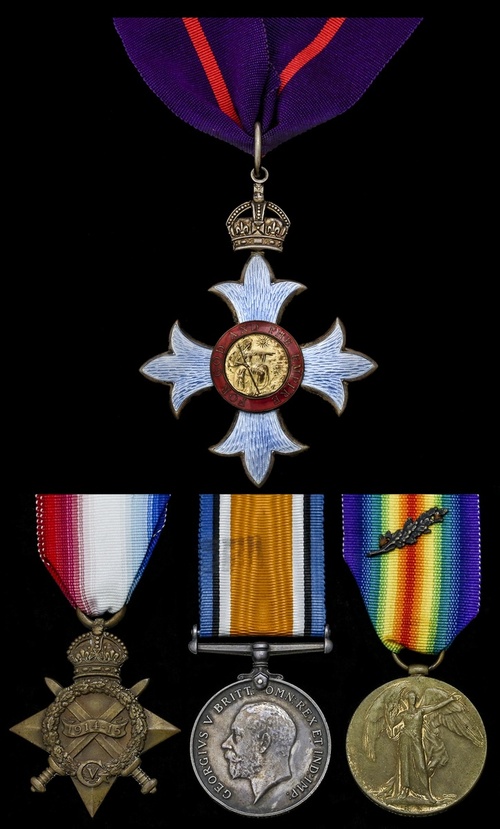
Auction: 17002 - Orders, Decorations and Medals
Lot: 362
A rare Kuki Rebellion operations C.B.E. group of four awarded to Lieutenant-Colonel W. B. T. Abbey, Indian Army
The Most Excellent Order of the British Empire, C.B.E. (Military) Commander's 1st type neck Badge, silver-gilt and enamel; 1914-15 Star (Major W. T. B. Abbey, Indian Army); British War and Victory Medals, M.I.D. oak leaf (Major W. T. B. Abbey), generally very fine or better (4)
C.B.E. London Gazette 23 July 1920:
'For valuable services rendered in connection with military operations in Burma.'
Walter Bulmer Tate Abbey was born on 8 August 1872, the son of Walter Abbey of Wellingborough Grange, Northamptonshire. Educated at Monkton Combe and Sandhurst, young Walter was commissioned in the Durham Light Infantry in September 1892.
Transferring to the Indian Army in the following year, he joined the 7th Bombay Lancers and, in 1896, the 32nd Lancers. It was in the latter capacity that he served in operations against the Kara rebels in 1898.
In 1902, Abbey joined the Burma Commission and he was serving as a Deputy Commissioner at Myitkyina about the time of the outbreak of war. He was subsequently mentioned in despatches for operations in the Kachin Hills during January and February 1915, Major-General Rait stating that his 'local knowledge was of the greatest value' (London Gazette 4 July 1916, refers).
But it was for his part in crushing the Kuki Rebellion of 1917-19 that he was awarded his C.B.E. and another 'mention', the latter for 'distinguished service during the Kuki punitive operations' (London Gazette 23 July 1920, refers). The following extract has been taken from a definitive account of the rebellion; see http://www.kaiserscross.com/304501/525801.html
'The Kuki Rising was eventually put down by a combination of British military ruthlessness supported by modern weapons of war, assisted by Kuki pragmatism in submitting when morale was low and further resistance was seen to be futile. The Kuki Rising was not the most glorious of Britain's colonial actions and it was deliberately under-publicised at the time. However, the exertions and courage of the British sepoys in fighting serious and savage banditry over very hostile terrain deserve recognition.
Totalling the results of military operations between December 1917 and May 1919, 140 rebel villages were destroyed, 112 rebel villages submitted and 15 villages were found deserted. In Manipur 970 muskets were confiscated whilst in the south Chin Hills over 600 were handed in. Large amounts of grain and cattle were also confiscated. The estimated number of Kukis killed was 126 men, but doubtless others died of wounds away from the scenes of action, especially when the new British weapons came into use. The British lost 59 all-ranks killed, 135 wounded and 97 dead from other causes, principally disease.
The whole affair had been an embarrassment to the Government of India and the campaign was denied publicity. Participation in the campaign did not qualify for a clasp to the India General Service Medal; however, troops who served in the field for any period from the start of the Kuki rising until 31 October 1918 qualified for the award of the British Victory Medal. Two Distinguished Service Orders were awarded but the citations were not published.
The last word must go to the Kukis. They led the British on a merry dance for 18 months armed only with ancient muskets, they carried no packs and had no supply trains or medical support but they knew their own country well and how to live off it and fight effectively from it. They were a tough and fierce adversary who commanded the respect of all who went up against them.'
Abbey, who was advanced to Lieutenant-Colonel in September 1918, was placed on the Retired List in November 1920. The author of several publications - including A Manual of the Maru Language - he lived in Tangier, Morocco and in Sydney, Australia, at which latter city he died in March 1949; sold with copied research.
Subject to 20% VAT on Buyer’s Premium. For more information please view Terms and Conditions for Buyers.
Estimate
£600 to £800




